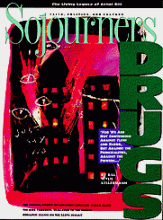10:30 a.m. The knocking at the front door was loud and persistent. A D.C. police officer wanted to know if I had heard anything unusual around dawn that morning.
Nothing unusual. The streets had been noisy the night before—folks out sitting on their stoops until late and playing music loudly in celebration of the warm weather that had just arrived. People were in and out of the crackhouse across the street. But there had been no gunshots, no cries for help that night.
The police officer took me to the porch two doors down—Thelma's porch. The large front window had been knocked out; shattered glass lay everywhere. Thelma came out and explained that somebody had picked up a chair off her porch and threw it through the window. He was being chased by a man with a gun at the time and took refuge in Thelma's living room.
"This is it for me," Thelma said. "I've lived here for 26 years. Raised my kids here. They all graduated from Cardoza and got good jobs." She nodded toward the high school at the end of the block. "But I can't take it anymore."
It wasn't only the violence that was getting to Thelma. Her landlord had raised the rent, she said, to $1,100 a month—an outrageous sum for a small house on which he refused to do repairs. Thelma vowed to be gone as soon as she could figure out where to go. Her grandchildren, who live with her and play hide-and-seek on the long row of our connected porches, will be gone as well.
Read the Full Article
